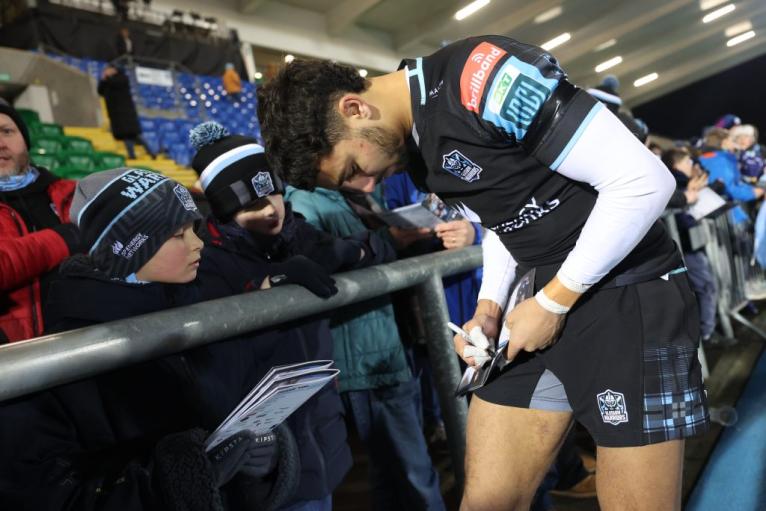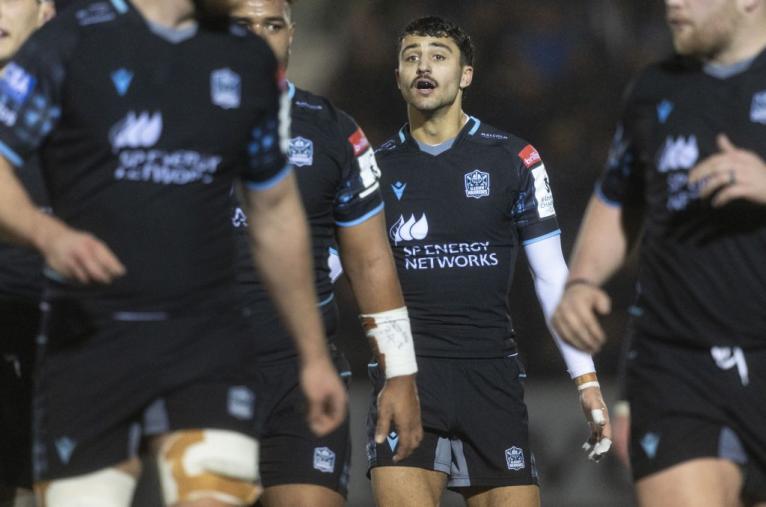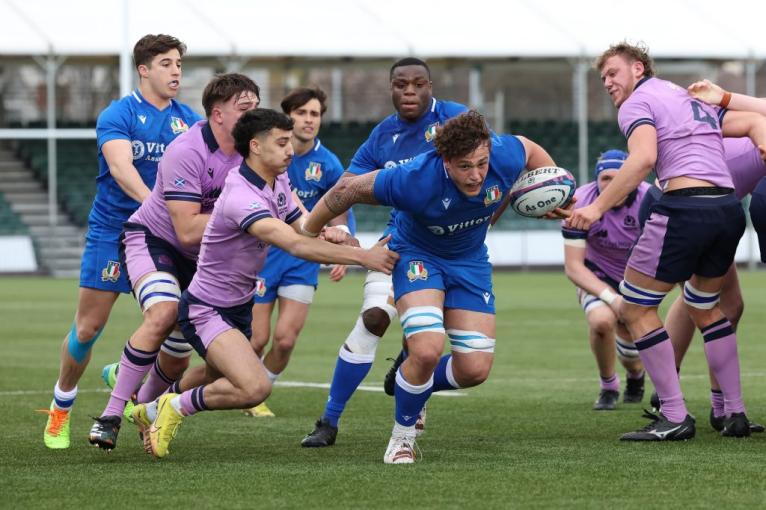Scotstoun on a bleak Friday night. Ulster in town and very much in command. Sean Kennedy, swooping onto the plastic turf to spark Glasgow’s revival and his chosen hype tune piped around the stadium. Warming up behind the posts, Ben Afshar smiled.
Afshar is Glasgow’s newest Warrior, a burgeoning 20-year-old talent thrust into his first professional matches over the past month. He is also the club’s slightly bashful resident DJ, ploughing what little time he has between elite rugby and an economics degree into his musical craft.
Kennedy plumped for Afshar’s jaunty homemade number Live as his try banger, giving Scotstoun a flavour of the song which has close to 40,000 plays on Spotify.
“It was during the 2020 lockdown when I was still at school, I made that in the garden when it was sunny,” the scrum-half tells RugbyPass. “People seemed to find it quite catchy. Every club I go to, everyone seems to learn it and sing it. It’s fun to sing along to and it was easy to make.”

Athletes need an outlet to soothe the strains of professional sport and Afshar’s is his DJ gear.
“I have a big setup at my family home in Edinburgh, I do a lot of old records, 90s hip-hop, modern garage and house music. I’ve got a big, big record collection. I love doing it. It’s a hobby I’ve had since I was 15. I do it at parties if people ask, I’ve done a few of my friends’ 21st birthdays and have two more booked in for January.
“I lose track of time a bit when I do it. I’ll sit and DJ away for a few hours just trying stuff. I’m so concentrated on it, I’m paying attention, it gets me away from rugby. It’s not like sitting watching TV scrolling through your phone. I probably spent too much of what I earn on it.”
Recently, Afshar has had to cut down his hobby. This is his second year training with the big dogs and he did not expect an opportunity to appear quite as suddenly as it did, when fate cleared the scrum-half logjam in his path. Ali Price was loaned to Edinburgh. Jamie Dobie badly injured an ankle. George Horne picked up a knock. Franco Smith toyed with hiring a short-term option, but preferred to back his Scotland Under-20 co-captain. In a flash of Glaswegian lightning, Afshar went from fifth choice to Kennedy’s back-up.
All last year I knew I wasn’t going to play, you’ve got three international scrum-halves here plus Sean Kennedy.
The weekend before Glasgow played Ulster, he was helping Stirling Wolves claim the semi-professional SuperSeries Championship. Two days later, he fetched up at Scotstoun, took a look around and realised there were only two nines in training.
“That’s when it was like, oh my god, I might be playing this weekend. I have to thank the coaches because it would have been really easy to get someone else in but they kept saying ‘we have 100% confidence in you’. I am so grateful for the opportunity.
“All last year I knew I wasn’t going to play, you’ve got three international scrum-halves here plus Sean. It’s a great environment because I’ve got so much experience around me but if you look at potential to play, it’s quite a big thing for them to play me.
“I was really nervous but even though I got on for only three minutes, it just settled the nerves. It doesn’t feel as big a deal going out there now.”

Afshar’s sociable childhood helped him find his niche in the Warriors squad. A rich Persian theme ran through his upbringing, instilled by an Iranian father. Ali Afshar and his three brothers left their homeland for Edinburgh as teenagers. The boys started a prolifically successful construction company and have each raised their families in the Scottish capital.
“I literally saw my cousins all the time,” Afshar reflects. “I thought that was normal until people would tell me they hadn’t seen their cousins in a year and I saw mine every day. I grew up with my grandma living with us, loads of Iranian food. Whenever we do meals it’s: you bring this, I’ll bring that.
“There are lots of kebabs. Lubia polo is my favourite, it’s a rice dish with lamb, broad beans, tomatoes. They do tadhig as well, where you cook rice with a bit of oil at the bottom of the pan and it fries the rice, it’s really crispy – that gets eaten quickly.”
Afshar took up rugby at Edinburgh Accies, and went on to Merchiston Castle School, the rugby nursery which counts Glasgow colleagues Stafford McDowall, Fraser Brown, the great Roger Baird and England number eight Zach Mercer among its impressive international alumni.
The pathway for young Scots is not straightforward. In a small rugby ecosystem, player development is an imperfect science with unique pressures. There are only two pro-teams, but each is handsomely funded, and coaches are under pressure to deliver results as well as polish home-grown talent. Scotland’s under-20 players struggle for URC game time and have incurred some grim beatings by better prepared and physically stronger opposition. A green squad, co-skippered by Afshar, fell two games short of winning back their spot at World Rugby’s top-tier Under-20 Championship during the summer.
A lot of the boys who are still under 20 need that physical development. Especially forwards, you need them in the gym, you need constant eyes on them because you are still a young kid.
“It’s just a depth thing,” he says. “Now all the academy boys are under-20s which is good because you’ve got 30 players who are in full-time environments. That definitely pushed me on a bit. Even comparing them from when they came in over summer to now, they are miles better.
“Coming in from playing SuperSeries is a big step up, the speed of the game, you do something wrong and you get punished. Last year it was quite tough as an academy player training at Glasgow and competing in the SuperSeries with boys whose main purpose is that club.
“When you’ve only got two pro-teams there’s not much you can do, you’ve just got to wait your time, and it does come.”
The danger is that too many capable young players are playing too little meaningful rugby. Stagnation is a risk. So is the stalling of potential. Gregor Townsend has spoken frankly about the need to “get our young players through in more numbers and quicker” and Scottish Rugby may need to seek creative solutions.
But as a player at the heart of the issue, Afshar warns against simply sending youngsters on loan down the English system and assuming they will return better for the experience.
“You look at that fourth or fifth choice player and think, right, he’s not going to play at Glasgow so let’s loan him out. If you loan him out, is he going to play at a Championship club? A lot of the time it’s an 18 or 19-year-old with loads of potential but a Championship club want an older pro.
“We don’t have heap of players compared to other nations – that’s why the SuperSeries is good at getting people game time at a decent level. Even though it is a bit slower, you can see if boys don’t turn up physically, they get battered. It is easy to say, ship them off somewhere else, but you’re not really solving any problems.
“If a player is definitely good enough to play in the Championship but too far down the pecking order to play here then that’s a great option. But a lot of the boys who are still under 20 need that physical development. Especially forwards, you need them in the gym, you need constant eyes on them because you are still a young kid and if you don’t have someone pestering you, you are not going to do what you should. The academy boys here have just been chucked into a big pre-season block coming up for the Six Nations and that’s what a lot of them need.
“There’s a bit of a sticking point between 20 and 23 years old when you’re trying to break through but you can’t play under-20s, and you could just get stuck playing SuperSeries. That’s when you look, if he’s ready, let’s try and get him down in the Championship.”

Afshar feels his time in the semi-pro ranks sharpened him sufficiently to climb the ladder. Still, when he was set loose among the international behemoths of the Glasgow pack, there was a knot in his stomach. Even a rookie scrum-half must whip his cattle around the paddock.
The sheer pace of the game shocked him too. Glasgow’s blueprint depends on quick ball – they have the fastest ruck speed of any URC side this season and last – and their key string-pullers choosing the right options with it.
“I back my skillset, it’s making the correct decision at the correct time,” he says. “The coaches want you to get the ball away as fast possible but you’ve got to take space if it’s there, kick if there’s space to kick into, that decision-making under the pressure and speed of the game is what I’m trying to work on.
“The first week I was in, I was way too quiet. Over the last couple of weeks I’ve realised those boys want to be told where to go and what to do and they’ll listen to you. You are in that position for a reason and they back you 100%.
“The week I got my debut, Matt and Zander Fagerson, George Turner, all these boys I’ve watched on TV, told me to be bossy and they would listen to me – and they do. Trying to find my voice is important.”
By the end of games we are flying; we are so slow to start. We can’t just wait to half-time to be told to work for it.
From semi-pro rugby to the game’s ultimate club stage. Afshar is now a Champions Cup player, one Smith chose to lean on in the throes of a massive game. Glasgow trailed Northampton 22-5 at half-time and the coach sent for Afshar. He brought direction, zip and some effective kicking in the Glasgow squall. The wider concern for Warriors is their recent propensity to begin games in a state of stupor, falling at least two scores behind in three of their past four matches.
“On Friday I was told to go out there and be confident, play how you play,” Afshar says. “It wasn’t, ‘this is what you should do’, it was just about liberating myself.
“By the end of games we are flying; we are so slow to start. We can’t just wait to half-time to be told to work for it. The start needs to be way stronger. We have such a good structure in attack and defence, we need to play to it and express ourselves properly instead of just sitting off and needing the reaction of, ‘oh no, we need to chase the game’.”
Glasgow and Afshar head to the Pays basque this weekend. A clutch game against Bayonne in the iconic Stade Jean Dauger. The locals will belt out the haunting Pena Baiona pre-match but if Glasgow do the business, expect DJ Afshar to have the away shed rocking.



Ben is a hugely exciting player, a real talent-as well as humble and exceptionally polite 💙🖤